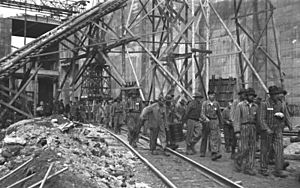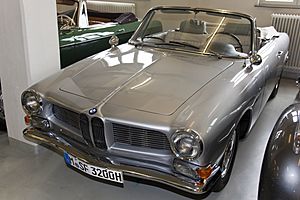Herbert Quandt facts for kids
Quick facts for kids
Herbert Quandt
|
|
|---|---|
| Born | 22 June 1910 Pritzwalk, Kingdom of Prussia, German Empire
|
| Died | June 2, 1982 (aged 71) |
| Occupation | Industrialist |
| Spouse(s) |
|
| Children |
|
| Parents |
|
| Relatives | Harald Quandt (half-brother) |
Herbert Werner Quandt (born June 22, 1910 – died June 2, 1982) was a German industrialist. He is famous for saving the car company BMW when it was almost going out of business. He also helped make BMW a very successful company.
However, during World War II, the factories owned by his family used tens of thousands of forced laborers. Many of these workers suffered greatly or died.
Contents
Herbert Quandt's Early Life
Herbert Quandt was born in Pritzwalk. He was the second son of Günther Quandt and Antonie Quandt. His mother, Antonie, passed away in 1918 from the Spanish flu.
When Herbert was nine years old, he developed an eye disease that left scars. This condition made him almost blind. Because of his eyesight, he had to be taught at home instead of going to a regular school.
The Quandt Family During World War II
A documentary film called The Silence of the Quandts was released in 2007. It showed the role of the Quandt family's businesses during the Second World War. Before this film, many people did not know much about the family's past during the Nazi era.
The documentary revealed that the Quandt family's factories used forced laborers during the war. After the film was shown, the Quandt family decided to fund a research project. A historian studied the family's activities during Adolf Hitler's time in power. The study, published in 2011, concluded that the Quandts were closely connected to the crimes of the Nazis.
Forced Labor in Factories

Herbert Quandt received extensive training in his family's companies. In 1940, he became a member of the executive board of AFA, which later became VARTA AG. He was also a director at Pertrix GmbH, a company in Berlin that belonged to AFA.
During the war, Herbert Quandt was in charge of personnel at his family's factories. These factories used a large number of forced laborers, starting as early as 1938. The conditions for these workers were very harsh. For example, in one factory, the air contained acid gas, which made many workers very sick.
More than 50,000 forced laborers worked in the Quandt factories during the war. Some factories, like the AFA plant in Hanover, even had concentration camps on their grounds. After the war, Herbert Quandt was not put on trial. His father was held for a time while being investigated.
Benjamin Ferencz, a prosecutor at the Nuremberg Trials, later said that if all the information known today about Herbert and his father had been available then, they would likely have been tried for crimes against humanity.
After the War: Business Success
After 1945, Herbert Quandt took on more responsibility for the companies his father had owned. He worked to rebuild them. He believed in a business approach where different parts of the company had the power to make their own decisions. This also allowed employees to share in the company's success.
When his father passed away in 1954, the Quandt group was a huge collection of about 200 businesses. These included battery makers, metal companies, textile companies, and chemical companies like Altana AG. The group also owned about 10% of Daimler-Benz and about 30% of BMW.
The Quandt group was then divided between Herbert and his half-brother, Harald Quandt. At that time, BMW was struggling and almost bankrupt. In 1959, BMW's managers even suggested selling the company to Daimler-Benz. Herbert Quandt was close to agreeing to this sale. However, he changed his mind at the last moment because the workers and trade unions were against it.
Instead, Herbert Quandt decided to increase his share in BMW to 50%. This was a big risk, and his bankers advised him against it. But he went ahead and invested much of his own money. He played a key role in turning the company around by funding the BMW 700 car model. This car helped BMW become profitable again.
BMW was already planning its BMW 1500 model when Quandt took control. This car was launched in 1962. It created a new type of car in the market: a high-quality production sedan. This car fit between mass-produced cars and very expensive luxury cars. BMW's advanced technical skills helped it succeed in this new area. The BMW 1500 model firmly established BMW's long-term success.
In 1967, Harald Quandt died in a plane crash. Herbert then received more shares in BMW, VARTA, and IWKA. In 1974, Herbert and Harald's widow, Inge, sold their shares in Daimler-Benz to the government of Kuwait.
Herbert Quandt's Family Life
Herbert Quandt was married three times. His first wife was Ursel Münstermann, whom he married in 1933. They divorced in 1940. They had one daughter, Silvia Quandt (born 1937), who is now an artist.
In 1950, he married his second wife, Lieselotte Blobelt. They divorced in 1959. This marriage had three children: Sonja (born 1951), Sabina (born 1953), and Sven (born 1956). Sven later became the manager of the BMW rally team.
Herbert married his third wife, Johanna Bruhn, in 1960. She had worked as his secretary and personal assistant. Johanna did not remarry after Herbert's death. She lived quietly in Bad Homburg until she passed away in 2015.
Today, Herbert's children from his third marriage, Stefan Quandt and Susanne Klatten, are important members of BMW's supervisory board. Stefan owns 23.7% of BMW shares, and Susanne owns 19.2%. They joined the board in 1997.
Herbert made sure that the shares in his companies were well distributed among his children. To avoid family disagreements, the children from his earlier marriages received large shares in other Quandt family companies. For example, Silvia Quandt received many investments and properties. The three children from his second marriage received most of the shares of VARTA Battery AG, which have since been sold. Susanne also received his shares in Altana AG, and Stefan received shares in a company called Delton AG, which deals with medical products and power supplies.
Herbert Quandt passed away on June 2, 1982, in Kiel.
Today, there is a foundation named after Herbert Quandt through BMW.
 | Mary Eliza Mahoney |
 | Susie King Taylor |
 | Ida Gray |
 | Eliza Ann Grier |


